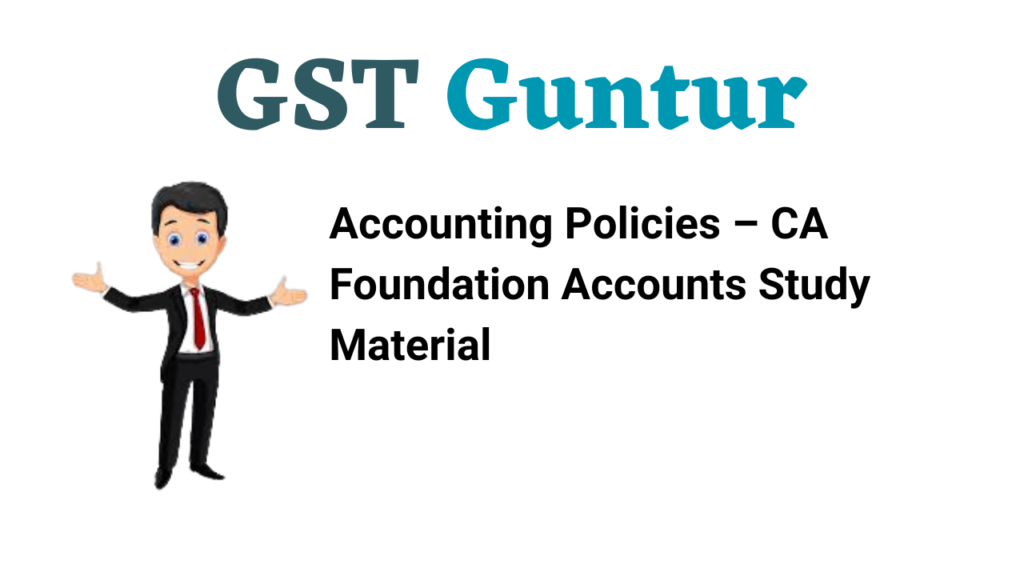Accounting Policies – CA Foundation Accounts Study Material is designed strictly as per the latest syllabus and exam pattern.
Accounting Policies – CA Foundation Accounts Study Material
Question 1.
What do you mean by Accounting policies? What are the basis of their selection? What are the different areas in which different accounting policies are possible?
Answer:
Meaning of Accounting Policy:
→ The accounting policies refers to
- the specific accounting principles and
- the methods of applying those principles
→ Adopted by the enterprise in the preparation and presentation of financial statements.
→ Management has to select, follow & disclose Accounting policies which it followed in preparation & presentation of financial statement, out of the different alternatives which may be permissible.
→ Example : Write off Depreciation by SLM or WDV, Value inventory cost by FIFO or Weighted Av.
→ Further Examples of Accounting Policies:
- Recognition of contract revenue by % of completion method
- Treatment of Goodwill
- Valuation of Investments
- Provision for Retirement benefits etc.
Preparation of financial statements is the responsibility of the management of an enterprise. This includes selecting appropriate accounting policies and applying them consistently from one period to another.
Requirements of AS-1 Disclosure of Accounting Policies:
For proper understanding of financial statements, all significant accounting policies adopted in the preparation and presentation of financial statements should be disclosed.
→ Disclose all significant policies adopted in the preparation & presentation of financial statements preferably at one place.
→ The primary consideration in the selection of accounting policies by an enterprise is that:
a the financial statements prepared and presented on the basis of such accounting policies should represent a true and fair view of the financial position & performance.
→ The major considerations governing the selection and application of accounting policies are:
- As per concept of Substance over form, the transaction should be recognized as per the economic reality of the transaction & not mere legal form.
- All material information which is relevant for the proper disclosure of true & fair position, should be disclosed prominently in the accounts & financial statements.
- If any fundamental accounting assumption is not followed – (Going concern, Consistency or Accrual)
- The expenses or Income of periodic nature accrues on day to day basis.
- It implies that the concern will be continuing the business for foreseeable future.
- It is assumed that the enterprise has neither the intention nor the necessity of liquidation or of curtailing materially the scale of the operations.
Areas in which differing accounting policies are encountered:
| Areas | Differing Accounting Policies possible |
| Methods of depreciation, depletion and amortization. | Straight line method, Written down value method. |
| Treatment of expenditure during construction. | Capitalize, expense, treat as deferred revenue expenditure. |
| Valuation of inventories. | Different cost formulas FIFO, Weighted average cost, etc. |
| Treatment of goodwill. | Amortize, do not amortize. |
| Valuation of investments. | Cost, lower of cost and fair value, fair value |
| Recognition of profit on long-term contracts. | Percentage of completion method, completed contract method, different ways of measuring percentage of completion. |
| Valuation of fixed assets. | Costs less depreciation, costs, Costs less depreciation less impairment. |
| Treatment of contingent liabilities. | Make provision, disclosures only. |
![]()
Question 2.
When changes in accounting policies are permitted? What disclosures are to be made whenever change takes place?
Answer:
Changes in accounting policies:
Changes is permitted:
(As per AS-5: Net Profit or loss for the period, Prior period items & Changes in accounting policy)
- To comply with law
- To comply with an accounting standard
- To give better information and true & fair picture
Disclosure to be made whenever change takes place:
- Any change in an accounting policy which has a material effect should be disclosed.
- Reason for change, which can be any of the above.
- The amount by which any item in the financial statements is affected by such change should also be disclosed.
- This disclosure is necessary as change in accounting policy violates the fundamental accounting assumption of consistency.
- Where such amount is not ascertainable, wholly or in part, the fact should be indicated.
- If such change has no material effect on the financial statements for the current period but is reasonably expected to do so in the later periods, the fact of such change should be appropriately disclosed in the period in which the change is adopted.
Examples of change in accounting policy:
- Change from straight line method of depreciation to WDV method.
- Making provision for doubtful debts on the basis of age analysis rather than ad hoc provision.
- Change from completed contract method to percentage of completion method to account for construction to comply with AS-7(Revised)
- Changes in the method of measurement of percentage of completion as at balance sheet date.
- Change in method of amortization of intangible asset to reflect the re-vised pattern benefits from it.
- Re-estimating residual value of leased asset.
- Change from LIFO to FIFO method of ascertaining cost of inventory when AS-2 was revised.
